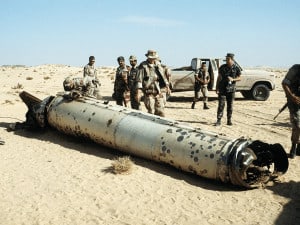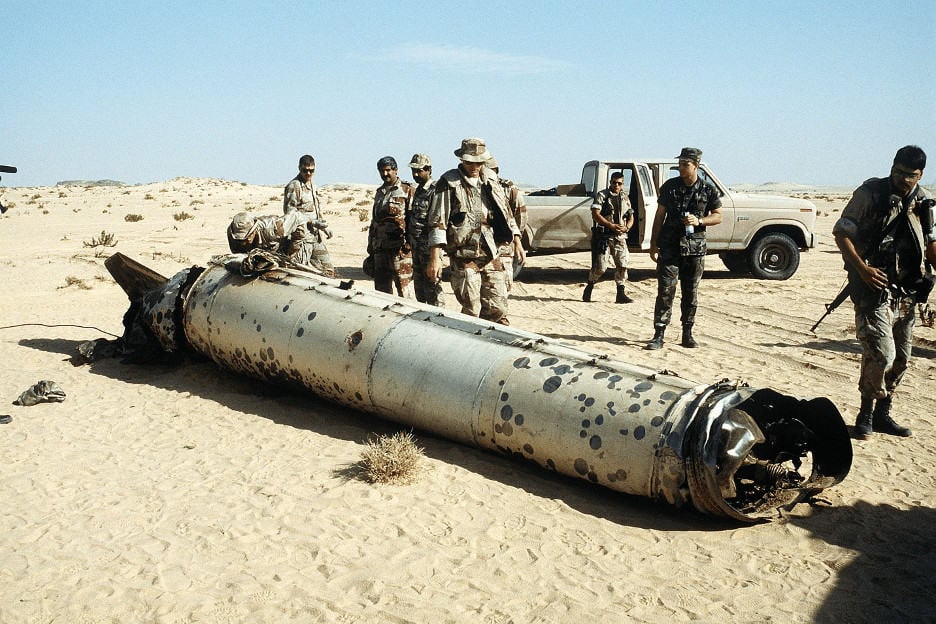Following the 1990–1991 Gulf War, the United Nations wanted to prevent any further aggression, and feared that Iraq had developed nuclear weapons of mass destruction. The rest of the world could only imagine the level of mass destruction and carnage that would result if Iraq decided to use such weapons.
As a result, the United Nations developed a Special Commission (UNSCOM) to inspect Iraq’s arsenal of weapons and to ensure that Iraq complied with the regulations and guidelines pertaining to weapons of mass destruction. The international community largely considered Iraq to be responsible for the start of the Gulf War due to its invasion and occupation of Kuwait in 1990. As such, UNSCOM required Iraq to recognize Kuwait as an independent country and pay war reparations. It also gave the United Nations extensive insight into and supervision over Iraq’s military structures and production.
During the investigation, the Commission discovered that Iraq had indeed created weapons of mass destruction as early as the 1980s. While Iraq initially complied with the UNSCOM mandates, there was some minor conflict between UNSCOM investigators and the Iraqi military. At one point in 1991, the Iraqi military fired warning shots at the investigators to prevent them from searching vehicles that were believed to contain contraband weapons. Iraq subsequently admitted to developing nuclear weapons for defensive purposes only and complied with the UN’s rules by destroying a large part of its nuclear arsenal in the summer of 1991. Amid suspicions that the United States was using the Commision to spy on the Iraqi military and Saddam Hussein, rather than to actually fulfill its original goals, UNSCOM ended its special investigation in 1998, and was replaced by the United Nations Monitoring, Verification, and Inspection Committee (UNMOVIC). Iraq ultimately agreed unconditionally to the searches by UNMOVIC in 2002, and the investigation ended altogether in 2005.
Ambassador Mary Ryan, a career Foreign Service Officer from New York City, was involved with the start of the United Nations Special Commission in 1990. In this assignment, she helped set up the Commission’s operations, and was impressed by the professionalism and knowledge of the people working on the Commission. At the beginning of the investigation, she saw firsthand the carnage left by coalition precision bombing in Baghdad, and learned about Iraqi attitudes toward the investigation when she interacted personally with some of the Iraqi citizens and officials involved with the weapons program.
Ambassador Mary A. Ryan’s interview was conducted by Charles Stuart Kennedy on March 26, 2003.
Read Ambassador Mary A. Ryan’s full oral history HERE.
For more Moments about Iraq’s weapons of mass destruction, click HERE and HERE:
Drafted by Genevieve Husak
ADST relies on the generous support of our members and readers like you. Please support our efforts to continue capturing, preserving, and sharing the experiences of America’s diplomats.
Excerpts:
“But there was tremendous confidence – well, almost certainty, it was certainty – that he [Saddam Hussein] did have weapons of mass destruction.”
Arriving in Baghdad for the Investigation: “We went to Baghdad, where I had my first experience with precision bombing, or the results of precision bombing, which of course, we had heard about on the Task Force and had watched on CNN. But it was amazing. We flew into a military airport outside of Baghdad. And there were all these hangars, and inside the hangars were all destroyed planes. Somehow the bombs had gone through – they hadn’t dropped on top of the hangars, they had gone through the hangars; it was like a giant had gone through just ripping up the planes. And then we got to Baghdad, and there would be buildings there with this hole in the middle; the buildings would be standing, and the communications center, or ministry, was gone. It was absolutely amazing. And we went to the UN headquarters in Baghdad, where we found – as we would have found had we gone, I’m sure, to the American Embassy, but we didn’t – their FSNs who had stayed and protected and tried to work as best they could during this whole terrible experience when the United States, well the coalition, and Iraq were at war. But what I remember one of the Iraqi FSNs telling us was that when people were asking – people knew him – people were asking how it was during the war, and he said that the thing that he couldn’t stand about it all was the screaming of the children when the bombs dropped. It cut me to the heart, because it was our bombing that was making the children scream.”
Search Begins for Iraqi Weapons of Mass Destruction: “Well, we were very confident then that he certainly had biological and chemical weapons, because we knew he had those; he had used them on his own people. The Israelis had bombed their nuclear reactor – whatever they were doing to build nuclear weapons – so there was some question about whether they had been able to put that back together. That was well before the war. I don’t remember when that happened, but I do remember that the Israelis did that, thank God. But there was tremendous confidence – well, almost certainty, it was certainty – that he did have weapons of mass destruction, at least in terms of chemical and biological weapons; that was then the responsibility for UNSCOM [the UN Special Commission on the Elimination of Iraqi Weapons of Mass Destruction] to find and destroy. And, in fact, they did find and destroy chemical stores…”
Iraq’s Reaction to the UN’s Investigation: “Well, the Iraqis that we were dealing with officially – that we called on – were hostile and unfriendly, but the people who were doing the – it wasn’t the negotiation, it was telling them what was going to happen – were extremely strong and didn’t ‘pull any punches’; they didn’t leave any room for the Iraqis to squirm around and get out of things. That’s what I remember being impressed with, because I didn’t know what the UN was like really and how they would behave. And then the Iraqis that we met in the hotel – like the staff of the hotel – were very friendly. The Iraqis who followed us around were very unfriendly and hostile… They were just the most horrible men – just very rough and hostile would be the only word that I can use, and very controlling. Because we were only allowed to go within the perimeter of the grounds of the hotel; we couldn’t go outside of that. I didn’t know if you would want to or not. I didn’t know what the Iraqi population would be like towards us. And then when we went in cars places, we always had them as an escort, and so we couldn’t deviate from the route that they let you have. They would take you. And they would always hang around the lobby of the hotel, so if you ever thought of trying to get out to see what Baghdad was like, you couldn’t, because they would stop you.”
TABLE OF CONTENTS HIGHLIGHTS
Education
BA in Political Science, St. John’s University 1958–1963
MA in Political Science, St. John’s University 1964–1966
Joined the Foreign Service 1966
Naples, Italy—Consular Officer 1966–1969
Swaziland—Ambassador 1988–1990
Kuwait—Executive Director of Consular Affairs, Kuwait Task Force 1990–1991


